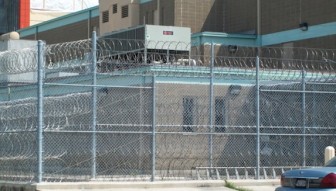Pretty much everything gets archived on news websites these days, and that’s important because even the best stories don’t seem to have a very long shelf life on the home page. Rich Webster’s piece on the latest stench wafting from the Orleans Parish Sheriff’s Office went up on NOLA.com late one night and was there to savor in the morning. After lunch, I went to reread it and pffft! it was gone.
A pity because it’s an excellent piece of work, the product of a collaboration with Lee Zurik at WVUE Fox 8 News that deserves a wide audience. The TV version was likewise hard-hitting and eloquent — classic Zurik. It seems to have lasted a little longer on the Fox home page. At least it was still there in mid-afternoon.
New Orleanians should expose themselves to both versions. They are part of an invigorated culture of strong investigative work that seems to have sprung up in this town since Katrina. The Lens does what it can, in that regard — tiny staff, hugely augmented by its expertise in data-based research and reporting. And the venerable Gordon Russell has been hitting home runs over at The Advocate, most recently with his exhaustive look at the costly tax breaks and outright exemptions Louisiana bestows on corporations and the well-connected.
I come not to praise fellow journalists, however, but to deplore the sleaziness that still seems to pervade New Orleans politics — notwithstanding sharp investigative work and the very welcome energies of Ed Quatrevaux. He’s the city’s inspector general whose office then-Mayor Ray Nagin tried assiduously to defund when the clamor for post-Katrina reform first took root. (Gee, Ray, how come you didn’t want an independent investigator at City Hall?)
[module align=”left” width=”half” type=”pull-quote”]Well, which is it? Does Major really have good records or are they too cumbersome and costly to create.[/module]The gist of Zurik and Webster’s recent report is that the sheriff’s office is signatory to a million-dollar-a-year technology contract for which the contractor, Major Services, provides little if anything in the way of invoicing, just the name of an employee and the hours worked. No description of the work performed, as would be the standard industry practice. In other words, we taxpayers — presumably including Sheriff Marlin Gusman — really don’t know what Major Services does on an hour-to-hour basis to earn that $1 million.
Our confidence in this arrangement is not enhanced by knowing that the contractor is Bobby Major Jr., a convicted felon who is also an old pal of Gusman’s. (His IT firm, claiming 31 employees but operating without a website, is domiciled in a house on Toulouse Street that once was and may still be Major’s home.) And it is of more than passing interest that the contract was overseen by another of Gusman’s friends and jailhouse employees, John Sens, now doing five years for contract rigging and kickbacks.
Gusman’s careless way with your tax dollars is only more astonishing for following fast on the heels of another such arrangement that Zurik exposed a couple of years ago. That one was with a law firm Gusman was paying a flat fee of $1.7 million a year without a contract or any requirement that the firm detail services rendered. Gusman defended the arrangement as a huge money-saver, a claim that fell apart in the harsh light of public scrutiny. A new contract requiring Usry Weeks & Matthews to bill by the hour and itemize its legal work capped the monthly fee at $65,000, cutting the firm’s annual take in half.

Zurik and Webster quizzed Major Services for more detail about billing practices, only to be told two things that, to my eye at least, seem self-contradicting. One is that detailed records are kept by the contractor and are made available any time the sheriff’s department questions anything. The other contention was that requiring the tech staff to actually jot down what work it performs and bill accordingly would slow response times and inflate costs.
Well, which is it? Does Major really have good records or are they too cumbersome and costly to create.
Zurik and Webster tell me that they asked Gusman for records supporting Major Services billings only to be stonewalled. Three weeks passed and Gusman had produced nothing, a clear violation of public-records law, which requires production of requested records within three days. At one point a PR firm hired by the contractor (your tax dollars at work) showed Webster some email chatter about work for the sheriff’s department, a photocopy of tasks performed on a particular day and some sort of end-of-year checklist. When Webster asked for copies, he was denied because of what the flack called the “security-sensitive” nature of the information.
Is there criminal intent behind all this, an effort to deliberately defraud taxpayers and shovel buckets of money to one of Gusman’s political allies? Maybe. Maybe not. Is this a classic example of the culture of cronyism which has so often shaded over into criminality in New Orleans? Absolutely. Just ask Nagin and his aide de camp (and IT expert) Greg Meffert. Both of them are now in prison.
Webster says he and Zurik are going to stay with the story, and I certainly hope they do because they’re off to a flying start. The next step, if the Times-Pic and Fox 8 still have the wherewithal in these difficult times to fight for their rights in court, is to insist that Gusman fulfill the public records request in compliance with the law. Major Services says the billings are supported by the records they keep to back up the data-deficient invoices they send out. That may make them “security sensitive.” It also makes them public property.
Jed Horne is news editor of The Lens.

